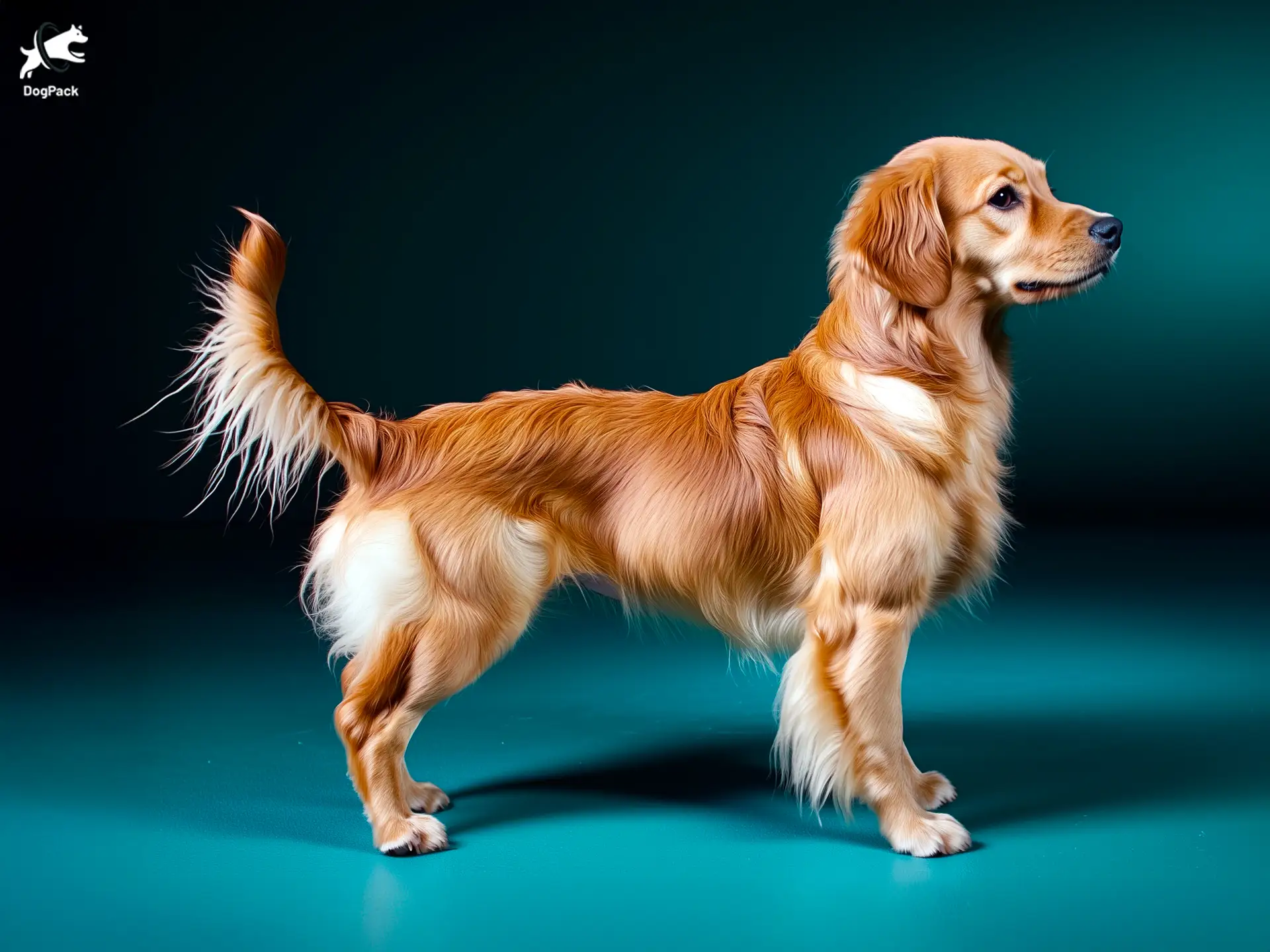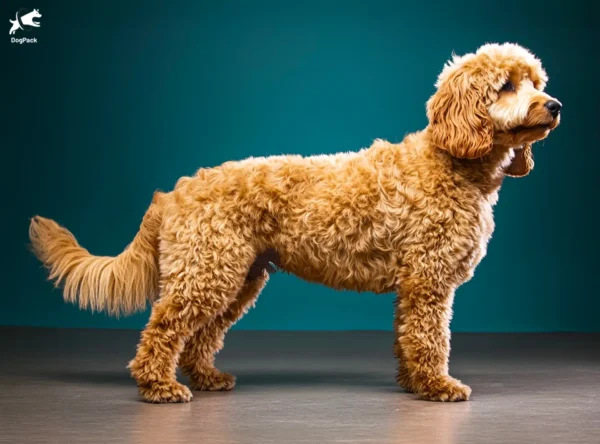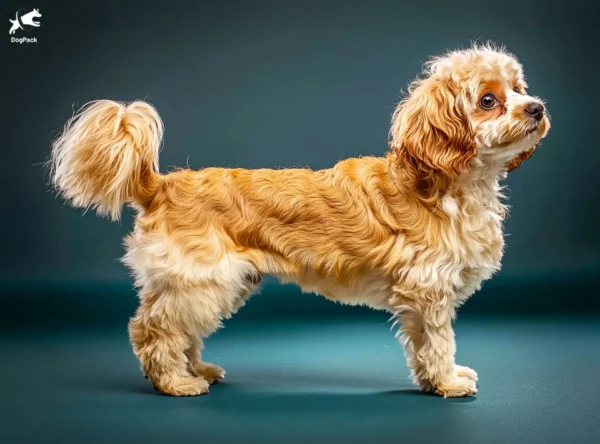Miniature Golden Retriever Dog Breed Info & Overview
Featherlight, comedic, and brimming with devotion, the Miniature Golden Retriever is a smaller spin on the classic Golden. Loved for its gentle temperament and unwavering loyalty, this dog rarely fails to charm new friends. Whether you’re a family of four or a solo city dweller, this compact companion fits seamlessly into a variety of lifestyles.
Characteristics
Pictures
Breed History
Despite its name, the Miniature Golden Retriever is a fairly modern creation, believed to have emerged in the early 2000s. Breeders sought to replicate the gentle, eager-to-please nature of the full-size Golden Retriever but in a scaled-down form. By crossing Golden Retrievers with smaller breeds such as Cocker Spaniels, Cavaliers or Poodles, they created this affectionate companion.
Early enthusiasts dubbed them “Comfort Retrievers,” highlighting their role as loyal, cuddle-ready pets for households craving a more compact version of the beloved Golden. As popularity grew, these pint-sized pups gained recognition among families, seniors, and individuals with smaller living spaces. Their history, though brief, is marked by a conscious effort to preserve the gentle spirit inherent in Golden lines.
Interestingly, breed clubs like the American Kennel Club have not recognized this petite retriever, given its hybrid lineage. Nonetheless, supporters celebrate the ‘mini’ version’s sweet, intelligent temperament, keeping it in high demand. Over time, it has earned a dedicated following among canine lovers seeking a smaller but equally enthusiastic sidekick for everyday adventures.
Temperament, Personality
Friendly and eager to please, these dogs inherit much of their Golden ancestry’s warmth. They thrive on human interaction, often following you from room to room just to stay close. While each pup’s personality can vary, most exhibit gentle dispositions and get along beautifully with children, seniors, and other pets.
Temperamentally, they strike a balance between playful exuberance and calm snuggle-time. In moments of high excitement, you might see them bounding around the house with a toy clutched in their jaws. But once the fun subsides, these pups happily settle beside you on the couch, resting their heads on your lap for a well-deserved cuddle session.
For those longing for a sociable, affable dog, the Miniature Golden Retriever typically surpasses expectations. Confident around visitors and pleasant with household companions, they rarely exhibit aggression or timidity if properly socialized. That said, consistent positive reinforcement from an early age ensures they grow into the charming, well-rounded friends that owners adore.
Physical Characteristics
These dogs retain the classic Golden look, boasting a glossy, wavy coat that can vary in shade from light cream to rich gold. Though smaller in stature, they still carry an athletic build, with a sturdy frame and a wagging tail that seems perpetually in motion. Their ears hang low, giving them an undeniably sweet expression.
Depending on the mix of breeds in their lineage, some may display slightly shorter snouts or a slimmer silhouette than the standard Golden Retriever. However, most preserve that signature broad head and inquisitive, friendly eyes. While they typically weigh under 45 pounds, they manage to look robust and well-proportioned rather than frail or dainty.
The Miniature Golden Retriever’s coat is usually dense and water-repellent, a nod to its retrieving heritage. With moderate feathering on the legs and chest, they exude a refined yet sporty appearance. Standing at around 14–18 inches at the shoulder, this compact canine is easy to pick up for a hug yet substantial enough for active play.
Health Issues
Because they inherit genes from multiple lines, these pups may bypass some ailments common in pure Golden Retrievers. Even so, hip dysplasia and patellar luxation remain potential concerns. Regular check-ups, including joint evaluations, can help detect issues early and ensure that your dog remains spry and comfortable throughout its life.
Like many smaller breeds, they can be prone to dental issues if oral hygiene is neglected. Brushing their teeth a few times a week and providing vet-approved dental chews can significantly lower the risk of plaque buildup. Additionally, periodic ear checks are crucial, as their floppy ears can harbor moisture, leading to infections.
The Miniature Golden Retriever generally boasts a life expectancy of 10 to 15 years. However, genetic testing and responsible breeding practices play a big part in promoting optimal health. If you’re considering one, insist on thorough health clearances and seek a veterinarian’s guidance on preventive measures like vaccinations, parasite control, and balanced nutrition.
Grooming Needs
Thanks to their Golden lineage, these dogs often have a double coat that sheds moderately year-round, with seasonal increases. Weekly brushing, particularly during heavier shedding periods, helps remove loose fur and prevents matting. A slicker brush or a metal comb can be invaluable tools for keeping their coat tangle-free and shining.
Bathing them every four to six weeks usually suffices, although more frequent baths may be necessary if they love rolling in the mud. Use a gentle, dog-specific shampoo to maintain the skin’s natural oils and prevent irritation. After bath time, be sure to dry their ears thoroughly to ward off excess moisture and potential infections.
For a Miniature Golden Retriever, occasional trims around the paws and hindquarters can keep them looking tidy. Professional grooming isn’t mandatory, but a seasonal visit to a groomer can help manage excess fluff. Don’t forget regular nail clipping and teeth cleaning—these small steps go a long way in preserving overall comfort and health.
Exercise Requirements
Although petite, this dog retains the sporty instincts of its Golden heritage. Engaging daily walks or brisk play sessions in the yard can help burn off their enthusiastic energy. Since they enjoy retrieving, consider tossing a tennis ball or a soft toy for them to chase—this appeals to their innate desire to run and fetch.
Most Mini Goldies thrive with around 45 to 60 minutes of exercise each day. Too little activity can lead to boredom and unwanted behaviors such as chewing or excessive barking. If space is limited, break the exercise into shorter sessions. Indoor games like hide-and-seek or tug-of-war can also keep them mentally and physically engaged.
If you have access to a secure outdoor area, let them romp and explore under supervision. Swimming can be another fun option, as many are confident in water—though always ensure safety measures. The Miniature Golden Retriever’s size makes it easy to accommodate their exercise needs, but a consistent routine is vital for overall well-being.
Training Tips
Known for their eagerness to learn, these pups respond excellently to positive reinforcement techniques. Short, focused training sessions that reward good behavior with treats and praise work wonders. Harsh methods often backfire, as these sensitive dogs can shut down if scolded too severely. Patience and a gentle approach typically yield quicker, more lasting results.
Socialization should start early, introducing them to various sights, sounds, and people. Expose them to friendly dogs in controlled settings so they develop healthy canine manners. Consistent boundaries help them understand what’s expected, minimizing confusion and potential mischief. Because they’re intuitive, they often pick up commands rapidly, especially if training sessions remain upbeat and playful.
For a Miniature Golden Retriever, advanced tasks like agility or trick training can be a fantastic way to keep them mentally sharp. Many owners find that puzzle toys and structured obedience classes reinforce good habits while strengthening the bond between dog and human. With their quick mind and loving disposition, they rarely tire of learning new skills.
Nutrition, Diet
Due to their moderate activity level, these dogs typically require about 1.5 to 2 cups of high-quality kibble split into two meals per day. Look for a formula that prioritizes real meat sources like chicken or salmon as the main ingredient. Avoid overfeeding, as Mini Goldies can be prone to weight gain if their diet isn’t monitored.
For extra energy and joint support, consider foods enriched with omega-3 fatty acids and glucosamine. These nutrients can help maintain a glossy coat and support healthy hips, which is especially important given the breed’s predisposition to hip issues. A balanced mix of proteins, fats, and carbohydrates ensures they remain lively without unwanted extra pounds.
The Miniature Golden Retriever often benefits from small treats during training, but be mindful of total calorie intake. If you’re incorporating wet food or homemade meals, consult with a veterinary nutritionist to keep portions appropriate. Whenever possible, schedule a check-up to evaluate your dog’s weight and adjust feeding plans as they grow, ensuring lifelong health.
Adoption, Breeders
Before you search for a Miniature Golden Retriever puppy, it’s crucial to differentiate between reputable sources and unscrupulous sellers. Look for breeders who health-test their parent dogs, provide transparent medical records, and raise puppies in a home environment. Reputable breeders will also be happy to answer your questions about lineage, temperament, and ongoing care.
Adoption is a wonderful alternative for those looking to give a home to a dog in need. Occasionally, breed-specific rescues or organizations focused on Golden Retriever mixes may have Mini Goldies awaiting their forever families. Check online platforms like Petfinder or Adopt-a-Pet to find local shelters and rescue groups offering these lovable companions.
For a deeper dive into this hybrid’s standards, Comfort Retriever offers an overview of their breeding philosophy and care guidelines. Whether adopting or buying, scrutinize health guarantees and ask about early socialization practices. Ultimately, finding the right match means prioritizing the well-being of both dog and owner—a principle that defines all successful adoptions.
Family Pet?
These dogs shine in family settings, thanks to their gentle demeanor and love for attention. They often form strong attachments with children, willingly participating in everything from tea parties to backyard ball games. Supervision with very young kids is still recommended, but their typically patient nature makes them an excellent choice for homes seeking a playful companion.
Many families appreciate how these pups adapt to varying energy levels, eagerly romping around one moment and snoozing the next. They excel at reading household dynamics, often matching their pace to the environment. As they are social by nature, introducing them to guests usually goes smoothly, and they relish any opportunity to broaden their circle of friends.
The Miniature Golden Retriever stands out if you’re seeking a sociable addition to a bustling household. Because they bond strongly with their pack, they rarely become aloof or distant. Instead, they offer unwavering loyalty and a readiness to participate in daily life, from afternoon walks to cozy movie nights—making them a delightful family pet in nearly any setting.
Right For You?
If you crave the sweet nature of a full-sized Golden but need a smaller dog, this hybrid might be perfect. Their approachable demeanor suits first-time owners, as long as you’re prepared to dedicate time to grooming and daily exercise. Apartment dwellers can also manage comfortably, provided there’s ample opportunity for walks, playtime, and mental stimulation.
They do best in homes where someone is around for most of the day since they love companionship. Prolonged isolation can lead to separation anxiety, so consider doggy daycare or pet sitters if your schedule keeps you out. Because these pups thrive on human interaction, families, retirees, or remote workers often find them an ideal match.
Overall, the Miniature Golden Retriever fits active individuals looking for a playful yet affectionate dog. They embrace both outdoor adventures and quiet evenings on the couch, adapting fluidly to different lifestyles. If a warm, friendly temperament and manageable size top your wish list, this might just be the companion you’ve been waiting for.
Conclusion
Whether you’re a busy family, a solo urbanite, or a retiree seeking company, this smaller Retriever mix brings warmth and joy to almost any setting. Their gentle disposition and manageable size make them accessible to many, while their lively spirit keeps life entertaining. Although they require regular grooming and daily exercise, the rewards of unwavering affection and playful companionship more than compensate. If you’ve been longing for the loyal nature of a classic Golden in a compact package, the Miniature Golden Retriever might just be your perfect match. With the right balance of attention, exercise, and care, these pups will reward you with a lifetime of loyalty and snuggles.
FAQs
-
Is the Miniature Golden Retriever a purebred dog?
No, the Miniature Golden Retriever is a designer breed, typically a mix of Golden Retriever, Cocker Spaniel, and/or Poodle. This mix aims to maintain the Golden Retriever’s appearance and personality in a smaller, more manageable size while reducing shedding with Poodle genetics.
-
How does a Miniature Golden Retriever compare to a full-sized Golden Retriever in personality?
The Mini Goldie has the same friendly, affectionate nature as a standard Golden Retriever but may inherit some stubbornness or higher energy from the Cocker Spaniel or Poodle. They often require slightly less exercise but still need daily mental and physical stimulation.
-
What is the expected size of a fully grown Miniature Golden Retriever?
A Mini Goldie typically weighs between 20-45 pounds (9-20 kg) and stands 14-20 inches (35-50 cm) tall, depending on the mix. Those with more Poodle genes may be smaller, while those with more Golden Retriever genetics may be on the larger end.
-
Do Miniature Golden Retrievers shed less than standard Golden Retrievers?
Shedding varies based on genetics. Mini Goldies with more Poodle influence may shed significantly less, while those with more Golden Retriever or Cocker Spaniel genes may still shed moderately. Regular brushing helps control loose hair regardless of coat type.
-
Are Miniature Golden Retrievers recognized by major kennel clubs?
No, the Mini Goldie is not recognized by major organizations like the AKC or FCI since it is a mixed breed. However, some hybrid registries, such as the Designer Breed Registry (DBR) and ACHC, may recognize them for tracking pedigree and breeding standards.
Breed Ratings
The Miniature Golden Retriever demonstrates quick learning and problem-solving skills, making training easier and enjoyable for new owners.
This breed is brimming with playful energy, always ready for fetch or tug. Expect plenty of goofy antics and an eagerness to join family fun.
The Miniature Golden Retriever needs daily exercise but isn’t hyper. Walks, fetching, or light jogging keep them balanced, making them great companions.
They have a moderate double coat, shedding steadily year-round. Regular brushing helps manage stray hairs, making shedding tolerable for most owners.
While they may chase the occasional squirrel, this breed generally has a lower prey drive. Proper socialization further reduces any desire to hunt.
Regular brushing and occasional trims keep them looking neat. Though not high-maintenance, their feathered coat does require a bit more care than short-haired breeds.
They pick up commands quickly, responding best to praise and treats. A gentle, consistent approach fosters cooperation, making them ideal for novice trainers.
Separation anxiety can arise if left isolated for too long. They thrive on human interaction, so consistent company or dog-sitters are recommended.
They usually only bark when excited or alerted, but prolonged boredom can increase vocalization. Proper exercise and stimulation keep noise under control.
Excessive drooling is uncommon, though they may salivate around mealtime. Overall, they’re relatively tidy compared to other retriever-type dogs.
They usually get along famously with other canines, given proper introductions. Their sociable nature often extends to dog parks and neighborhood pups alike.
Although relatively robust, they can inherit joint or eye issues. Routine vet check-ups and responsible breeding help maintain long-term vitality and well-being.













